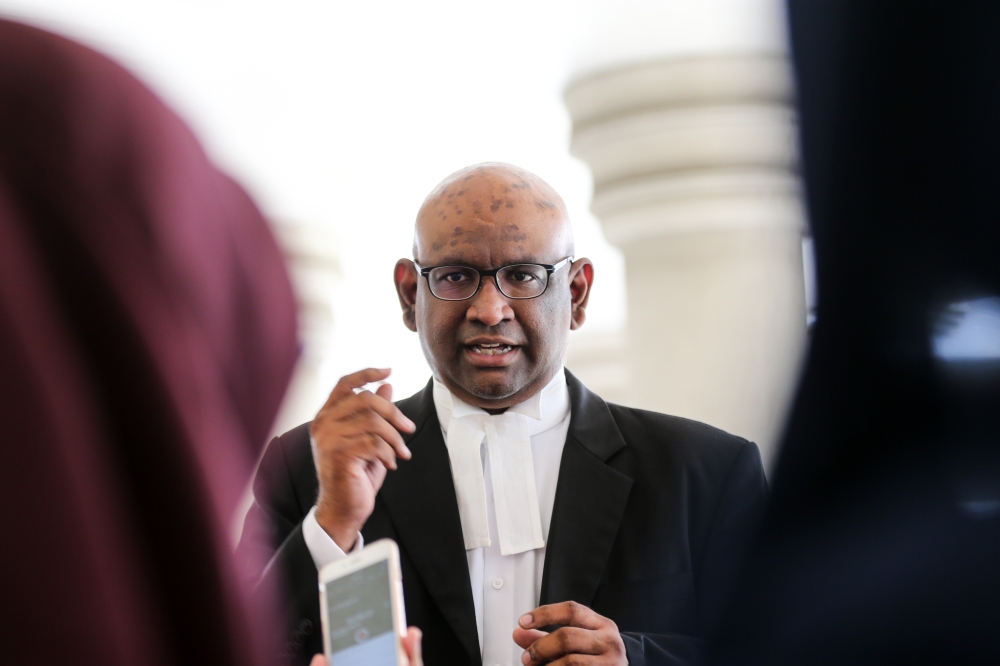Lawyer calls Kelantan’s plan to restore nixed shariah provisions contempt of court, others say ‘wordplay, linguistic gymnastics’ can’t fix unconstitutionality

The Kelantan legislative assembly’s plans to re-enact the same 16 shariah criminal offences in the state’s laws will amount to ‘contempt’ of the Federal Court, since Malaysia’s highest court had already ruled that the state has no power to make such laws, a lawyer said. — Picture by Yusof Mat Isa
Friday, 08 Mar 2024 7:00 AM MYT
KUALA LUMPUR, March 8 — The Kelantan legislative assembly’s plans to re-enact the same 16 shariah criminal offences in the state’s laws will amount to “contempt” of the Federal Court, since Malaysia’s highest court had already ruled that the state has no power to make such laws, a lawyer said.
When contacted by Malay Mail, several lawyers said Kelantan’s planned new provisions would still be unconstitutional even if the state government modifies the language used, as the Federal Court decided that only the federal government has the power under the Federal Constitution to make laws on criminal offences.
Constitutional lawyer Surendra Ananth when contacted said Kelantan “can’t reenact the same laws” found to be unconstitutional.
“The Federal Court has already determined that the state has no power to make such laws. Under our Constitution, the judiciary is tasked with determining whether laws are constitutional.
“The legislative assemblies are bound by the decision. It is highly contemptuous as it directly undermines the Federal Court decision,” said Surendra, who was one of the lawyers for two Muslim women who successfully challenged the constitutionality of Kelantan’s 16 Shariah criminal offences at the Federal Court.
In Malaysia, there are three organs or branches of government, namely the judiciary, the legislature, and the executive.
“I don’t think in our history has any organ directly challenged the judiciary and stepped over the Constitution in this manner,” he said, noting that there may have been situations in the past when the executive branch of government was unhappy with some court decisions but would then do things differently or amend the law.
But if Kelantan seeks to reinstall the same laws that were struck down as unconstitutional, Surendra said this would amount to a different scenario: “If they reenact the same laws in substance, they are basically saying that they are above the judiciary and Constitution.”

Friday, 08 Mar 2024 7:00 AM MYT
KUALA LUMPUR, March 8 — The Kelantan legislative assembly’s plans to re-enact the same 16 shariah criminal offences in the state’s laws will amount to “contempt” of the Federal Court, since Malaysia’s highest court had already ruled that the state has no power to make such laws, a lawyer said.
When contacted by Malay Mail, several lawyers said Kelantan’s planned new provisions would still be unconstitutional even if the state government modifies the language used, as the Federal Court decided that only the federal government has the power under the Federal Constitution to make laws on criminal offences.
Constitutional lawyer Surendra Ananth when contacted said Kelantan “can’t reenact the same laws” found to be unconstitutional.
“The Federal Court has already determined that the state has no power to make such laws. Under our Constitution, the judiciary is tasked with determining whether laws are constitutional.
“The legislative assemblies are bound by the decision. It is highly contemptuous as it directly undermines the Federal Court decision,” said Surendra, who was one of the lawyers for two Muslim women who successfully challenged the constitutionality of Kelantan’s 16 Shariah criminal offences at the Federal Court.
In Malaysia, there are three organs or branches of government, namely the judiciary, the legislature, and the executive.
“I don’t think in our history has any organ directly challenged the judiciary and stepped over the Constitution in this manner,” he said, noting that there may have been situations in the past when the executive branch of government was unhappy with some court decisions but would then do things differently or amend the law.
But if Kelantan seeks to reinstall the same laws that were struck down as unconstitutional, Surendra said this would amount to a different scenario: “If they reenact the same laws in substance, they are basically saying that they are above the judiciary and Constitution.”

Constitutional lawyer Surendra Ananth said Kelantan ‘can’t reenact the same laws’ found to be unconstitutional. — Picture by Shafwan Zaidon
Previously on February 9, the Federal Court in a 8-1 ruling decided that 16 provisions in a Kelantan state law — Kelantan Syariah Criminal Code (I) Enactment 2019 — were unconstitutional and invalid, as the state government had no powers under the Federal Constitution to make such laws.
On Wednesday, all those present — including opposition lawmakers — at the Kelantan state assembly’s sitting were reported to have unanimously voted in approval of a motion for the state to re-enact the 16 provisions that were struck down.
In Malaysia, Surendra said that when the courts strike down any provisions in state laws or federal laws, the expectation is that state legislative assemblies or Parliament would repeal such laws in response.
“In reality, the repeal part never happens. But the government will respect the decision and not enforce the law. But it remains in the books,” he said, noting that there would usually be “no issue” arising as the government would typically not enforce the struck down law despite the law remaining on the books.
In the current situation based on news reports, Surendra said Kelantan’s move to re-enact the provisions could arguably amount to being in contempt of the Federal Court’s February ruling, if the state legislative assembly makes the same laws “in substance”. He was of the view that there would be no need to file a new court challenge in such a case, but that contempt proceedings could cover this situation.
“I would think if the provisions are in substance the same, it would be in contempt of court and there is no need for separate proceedings.
“Of course, there has to be contempt proceedings initiated against the relevant people. It’s just that we haven’t had a situation like this. The AG has to do something about this,” he said, referring to the attorney general.
If the AG does not act, Surendra suggested that the litigant in the Federal Court case could also file for contempt proceedings against the Kelantan state legislative assemblyman who proposed the motion to re-enact the provisions and possibly the Kelantan state legislative assembly’s speaker for allowing such a motion.
“I think can be done now as based on reports, it is clear that the Federal Court’s decision is being undermined. Federal Court has decided only Parliament can make laws on the subject matters of the laws that were struck down,” he said, noting that the re-enacted provisions will still be unconstitutional if Kelantan changes the wording but it is still on the same subject matter that the state has no power to make laws on. He pointed out that states can only make laws on “pure religious offences”.
“If they are in substance the same laws they are still undermining the decision. The Federal Court decided they can’t make laws on those subjects. So, the question is, are they making the new laws on the same subject?” he said.
“When the court strikes down the law, the law is gone. But you also have to look at why the court struck it down. You can’t simply make a new law when it still goes against the reasoning of the court,” he later added.
If contempt proceedings are initiated and the Federal Court finds that there is contempt, the court could also “make consequential order to say any law passed on the same subject will be invalid”, he said.
He also said a fresh court challenge to strike down Kelantan’s planned new law can only be initiated after the law is enacted by the Kelantan state legislative assembly, and confirmed that contempt of court proceedings could also be initiated at that point.
Previously on February 9, the Federal Court in a 8-1 ruling decided that 16 provisions in a Kelantan state law — Kelantan Syariah Criminal Code (I) Enactment 2019 — were unconstitutional and invalid, as the state government had no powers under the Federal Constitution to make such laws.
On Wednesday, all those present — including opposition lawmakers — at the Kelantan state assembly’s sitting were reported to have unanimously voted in approval of a motion for the state to re-enact the 16 provisions that were struck down.
In Malaysia, Surendra said that when the courts strike down any provisions in state laws or federal laws, the expectation is that state legislative assemblies or Parliament would repeal such laws in response.
“In reality, the repeal part never happens. But the government will respect the decision and not enforce the law. But it remains in the books,” he said, noting that there would usually be “no issue” arising as the government would typically not enforce the struck down law despite the law remaining on the books.
In the current situation based on news reports, Surendra said Kelantan’s move to re-enact the provisions could arguably amount to being in contempt of the Federal Court’s February ruling, if the state legislative assembly makes the same laws “in substance”. He was of the view that there would be no need to file a new court challenge in such a case, but that contempt proceedings could cover this situation.
“I would think if the provisions are in substance the same, it would be in contempt of court and there is no need for separate proceedings.
“Of course, there has to be contempt proceedings initiated against the relevant people. It’s just that we haven’t had a situation like this. The AG has to do something about this,” he said, referring to the attorney general.
If the AG does not act, Surendra suggested that the litigant in the Federal Court case could also file for contempt proceedings against the Kelantan state legislative assemblyman who proposed the motion to re-enact the provisions and possibly the Kelantan state legislative assembly’s speaker for allowing such a motion.
“I think can be done now as based on reports, it is clear that the Federal Court’s decision is being undermined. Federal Court has decided only Parliament can make laws on the subject matters of the laws that were struck down,” he said, noting that the re-enacted provisions will still be unconstitutional if Kelantan changes the wording but it is still on the same subject matter that the state has no power to make laws on. He pointed out that states can only make laws on “pure religious offences”.
“If they are in substance the same laws they are still undermining the decision. The Federal Court decided they can’t make laws on those subjects. So, the question is, are they making the new laws on the same subject?” he said.
“When the court strikes down the law, the law is gone. But you also have to look at why the court struck it down. You can’t simply make a new law when it still goes against the reasoning of the court,” he later added.
If contempt proceedings are initiated and the Federal Court finds that there is contempt, the court could also “make consequential order to say any law passed on the same subject will be invalid”, he said.
He also said a fresh court challenge to strike down Kelantan’s planned new law can only be initiated after the law is enacted by the Kelantan state legislative assembly, and confirmed that contempt of court proceedings could also be initiated at that point.

Lawyer Andrew Khoo said even rewording Kelantan’s 16 invalid provisions would not work, as it will still result in the state government trying to make laws that should fall under the federal government’s jurisdiction. — Picture by Saw Siow Feng
Playing around with the form won’t change the substance
Lawyer Andrew Khoo noted that “it would appear that what the Kelantan State Legislative Assembly is attempting to do is to re-draft the provisions so as to avoid any issue of unconstitutionality”.
But Khoo said even rewording Kelantan’s 16 invalid provisions would not work, as it will still result in the state government trying to make laws that should fall under the federal government’s jurisdiction.
“The issue before the Federal Court was one of jurisdiction. They held that the 16 provisions of the Kelantan Syariah enactment had strayed into the criminal jurisdiction of the federal government as set out in the Federal Constitution.
“It is difficult to see how the provisions could be redrafted so as not to violate the Federal Constitution. We are dealing here with broad areas of jurisdiction, and not simply the parsing of specific words.
“You can play around either the words, but ultimately, the state enactment will need to say that the violation of the enactment will result in a criminal prosecution. By doing that, the division of jurisdiction between the federal and state governments could already have been breached,” he explained.
When commenting on the possible argument that altering the language of the proposed new provisions would mean they would technically be different than those found to be unconstitutional, Khoo said the courts would not necessarily be looking at the letter of the enactments alone but also their purpose.
“If the state legislative intent is clearly to criminalise an act that falls within the jurisdiction of federal criminal law, then no amount of wordsmithing or linguistic gymnastics can save those revised enactments from being unconstitutional.
“The courts will be bound by the principle of stare decisis (doctrine of precedent) and the outcome should be the same. People need certainty in the law, and re-litigating the matter will not be helpful nor productive,” he said, when responding to the question of whether there would need to be a fresh court challenge to have the new provisions (if enacted) be invalidated due to the Federal Court’s February ruling.
When asked about the possibility that the Kelantan government could still seek to enforce the re-enacted provisions, Khoo said: “If it is wrong (because based on legal principle it violates the Federal Constitution), it will remain wrong no matter how often it is re-legislated.”
Asked whether it would be contempt of court for the Kelantan state legislative assembly to re-enact the provisions that were struck down, Khoo said: “I don’t think the issue of contempt of court comes into play here.”
“But I think if the state of Kelantan attempts repeatedly to revise the enactments and re-litigate the matter, this would clearly be one of those times where the Attorney General must step in and put an end to this matter. It would be an abuse of judicial time, a waste of legal resources and a violation of common sense,” he said.

Playing around with the form won’t change the substance
Lawyer Andrew Khoo noted that “it would appear that what the Kelantan State Legislative Assembly is attempting to do is to re-draft the provisions so as to avoid any issue of unconstitutionality”.
But Khoo said even rewording Kelantan’s 16 invalid provisions would not work, as it will still result in the state government trying to make laws that should fall under the federal government’s jurisdiction.
“The issue before the Federal Court was one of jurisdiction. They held that the 16 provisions of the Kelantan Syariah enactment had strayed into the criminal jurisdiction of the federal government as set out in the Federal Constitution.
“It is difficult to see how the provisions could be redrafted so as not to violate the Federal Constitution. We are dealing here with broad areas of jurisdiction, and not simply the parsing of specific words.
“You can play around either the words, but ultimately, the state enactment will need to say that the violation of the enactment will result in a criminal prosecution. By doing that, the division of jurisdiction between the federal and state governments could already have been breached,” he explained.
When commenting on the possible argument that altering the language of the proposed new provisions would mean they would technically be different than those found to be unconstitutional, Khoo said the courts would not necessarily be looking at the letter of the enactments alone but also their purpose.
“If the state legislative intent is clearly to criminalise an act that falls within the jurisdiction of federal criminal law, then no amount of wordsmithing or linguistic gymnastics can save those revised enactments from being unconstitutional.
“The courts will be bound by the principle of stare decisis (doctrine of precedent) and the outcome should be the same. People need certainty in the law, and re-litigating the matter will not be helpful nor productive,” he said, when responding to the question of whether there would need to be a fresh court challenge to have the new provisions (if enacted) be invalidated due to the Federal Court’s February ruling.
When asked about the possibility that the Kelantan government could still seek to enforce the re-enacted provisions, Khoo said: “If it is wrong (because based on legal principle it violates the Federal Constitution), it will remain wrong no matter how often it is re-legislated.”
Asked whether it would be contempt of court for the Kelantan state legislative assembly to re-enact the provisions that were struck down, Khoo said: “I don’t think the issue of contempt of court comes into play here.”
“But I think if the state of Kelantan attempts repeatedly to revise the enactments and re-litigate the matter, this would clearly be one of those times where the Attorney General must step in and put an end to this matter. It would be an abuse of judicial time, a waste of legal resources and a violation of common sense,” he said.

Constitutional lawyer K. Shanmuga said it would be ‘unconstitutional’ for the Kelantan state legislative assembly to re-enact the 16 provisions that were struck down. — Picture by Ahmad Zamzahuri
Risk of civil lawsuits if Kelantan re-enacts and seeks to enforce those laws
Constitutional lawyer K. Shanmuga said it would be “unconstitutional” for the Kelantan state legislative assembly (DUN) to re-enact the 16 provisions that were struck down.
“The DUN will be wasting taxpayer resources by making a law when they have no power to make such laws under the Constitution. The Kelantan state government will knowingly be acting unconstitutionally if they choose to enforce those laws, opening themselves up to civil suits and damages claims if they actually try and arrest anyone,” he said.
Asked if the Kelantan state government would be able to argue that the new provisions can be enforced as they were not the exact same provisions struck down by the Federal Court, Shanmuga said: “The Federal Court held that those laws were under the Federal List, and for Parliament to enact. No amount of wordplay can change that.”
Shanmuga was referring to the Federal Constitution’s Ninth Schedule, which contains two separate lists of what the federal government and the state governments can make laws on.
List I or the Federal List says what Parliament has powers to make laws on, while List II or the State List is a shorter list of what state legislative assemblies have powers to legislate on.
Asked if there is a need for a fresh court challenge to be filed against the Kelantan state legislative assembly’s new provisions if enacted to invalidate them, Shanmuga said this may not be necessary.
“To my mind, probably no. But it would be open to anyone to challenge it, and this time the Federal Court may not be so generous on the question of costs.”
“I think that in any such challenge, the Court should take the appropriate steps to ensure all the individual DUN members who vote in favour of re-enacting these unconstitutional provisions should have to pay costs personally if they insist on proceeding in this manner,” he said.
(In the two women’s challenge, the Federal Court did not give any order as to costs, which means all those in the court challenge would bear their own legal cost instead of the one who lost the challenge being required to pay for the other party’s costs.)
And when asked if it is contempt of court for the Kelantan state legislative assembly to re-enact the provisions that were struck down, Shanmuga said: “I am not aware of the exact details of what was said, and what is proposed, so I would not like to comment as to whether it is contempt in the true legal sense.”

Risk of civil lawsuits if Kelantan re-enacts and seeks to enforce those laws
Constitutional lawyer K. Shanmuga said it would be “unconstitutional” for the Kelantan state legislative assembly (DUN) to re-enact the 16 provisions that were struck down.
“The DUN will be wasting taxpayer resources by making a law when they have no power to make such laws under the Constitution. The Kelantan state government will knowingly be acting unconstitutionally if they choose to enforce those laws, opening themselves up to civil suits and damages claims if they actually try and arrest anyone,” he said.
Asked if the Kelantan state government would be able to argue that the new provisions can be enforced as they were not the exact same provisions struck down by the Federal Court, Shanmuga said: “The Federal Court held that those laws were under the Federal List, and for Parliament to enact. No amount of wordplay can change that.”
Shanmuga was referring to the Federal Constitution’s Ninth Schedule, which contains two separate lists of what the federal government and the state governments can make laws on.
List I or the Federal List says what Parliament has powers to make laws on, while List II or the State List is a shorter list of what state legislative assemblies have powers to legislate on.
Asked if there is a need for a fresh court challenge to be filed against the Kelantan state legislative assembly’s new provisions if enacted to invalidate them, Shanmuga said this may not be necessary.
“To my mind, probably no. But it would be open to anyone to challenge it, and this time the Federal Court may not be so generous on the question of costs.”
“I think that in any such challenge, the Court should take the appropriate steps to ensure all the individual DUN members who vote in favour of re-enacting these unconstitutional provisions should have to pay costs personally if they insist on proceeding in this manner,” he said.
(In the two women’s challenge, the Federal Court did not give any order as to costs, which means all those in the court challenge would bear their own legal cost instead of the one who lost the challenge being required to pay for the other party’s costs.)
And when asked if it is contempt of court for the Kelantan state legislative assembly to re-enact the provisions that were struck down, Shanmuga said: “I am not aware of the exact details of what was said, and what is proposed, so I would not like to comment as to whether it is contempt in the true legal sense.”

Constitutional lawyer Datuk Malik Imtiaz Sarwar, who also represented the two women including Kelantan-born lawyer Nik Elin Zurina Nik Abdul Rashid in the Federal Court case, said it is unclear how the annulled provisions could be re-enacted without going against the Federal Court’s ruling. — Picture by Shafwan Zaidon
Constitutional lawyer Datuk Malik Imtiaz Sarwar, who also represented the two women including Kelantan-born lawyer Nik Elin Zurina Nik Abdul Rashid in the Federal Court case, said it is unclear how the annulled provisions could be re-enacted without going against the Federal Court’s ruling.
“The Kelantan legislative assembly is free to enact any Islamic criminal law as long as it conforms to the Federal Constitution. It must however give due regard to the decision of the Federal Court in Iki Putra and Nik Elin. The Federal Constitution is, after all, the supreme law and binds legislative bodies.
“It is not clear how the Kelantan Legislative Assembly intends to reenact the provisions struck down by the Federal Court without defying the decision of the Federal Court in Nik Elin’s case. The court had definitively determined the invalidity of those provisions,” he told Malay Mail.
Constitutional lawyer Datuk Malik Imtiaz Sarwar, who also represented the two women including Kelantan-born lawyer Nik Elin Zurina Nik Abdul Rashid in the Federal Court case, said it is unclear how the annulled provisions could be re-enacted without going against the Federal Court’s ruling.
“The Kelantan legislative assembly is free to enact any Islamic criminal law as long as it conforms to the Federal Constitution. It must however give due regard to the decision of the Federal Court in Iki Putra and Nik Elin. The Federal Constitution is, after all, the supreme law and binds legislative bodies.
“It is not clear how the Kelantan Legislative Assembly intends to reenact the provisions struck down by the Federal Court without defying the decision of the Federal Court in Nik Elin’s case. The court had definitively determined the invalidity of those provisions,” he told Malay Mail.
they are not retards or morons, they know what the fed court ruling is all about but the simple folks in kelantan does not, all they know is Islam is under threat, this is where the lebais steps in to champion their cause
ReplyDelete